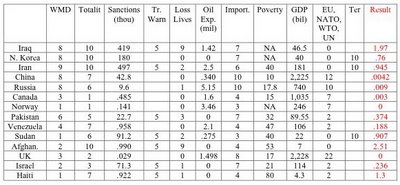In theory, if you could define all the factors that go into making a decision and could define exactly how important is each of these factors, and could define how these factors interact, you could make an equation that precisely solves any decision. Of course, to be perfect, this equation would have to be tweaked and amended to include the variables that are relevant to each person making the decision, and the framework of the equation would have to reflect their personal value systems, etc.
What a pain in the neck!
It's much easier (and funnier!) just to wink at the problem and shoot to mimic common sense as closely as possible with a minimum of variables. So that's what I try to do with these equations: match common sense, and hopefully provide a laugh. Will the equation provide the be-all, end-all answer to all of life's problems? No. But unless I miss some glaringly important variable (which I try very hard not to do—please comment if you catch something!) or somehow flub the math (which I don't think I've done yet, but I'm sure the day is coming), they should provide a fairly honest answer for the vast majority of people. And they're certainly much more accurate than that Magic Eight Ball you had in middle school!
It's like this: if you're deciding whether to walk, bike, or drive to work today, the most important variables are practicality and desire (do you want to and can you). I would probably break these up into time it would take, time you have, distance, how much stuff you have to carry, what the weather's like, and your physical condition. These "big" variables take into account a whole bunch of possible special situations. For example, we don't need a variable for "is your leg broken" because we already have a variable for "how long would it take you to walk?" Presumably, your reduced crutching speed would drive this equation toward driving : )
And once I've drafted an equation, I check it. No, I don't compare people using the equation to a control group in a controlled, double-blind test. Actually, I just pop the sucker into a spreadsheet and throw a bunch of test numbers at it, hoping that the results match common sense. "Whose common sense?" you might ask. Well, mine. And my dog's. He has a very good head on his shoulders. Unless he's around snow. Or water. Or other dogs. Or kids... Seriously, though (did I just write "seriously, though"? I sound like a cruise ship comedian...), the funny in these equations is in giving them to people who need a substitue for common sense. Look left; look right; if neither of these people needs equations to simplify their lives, it might be you.
So, the equations are logical and they "work". Meaning that if you put in honest numbers, they return honest answers—especially if you look over the list of variables and they look like the factors you would use in making the decision. But (wait for it...) you still have free will (or maybe you never had it in the first place).
And there are a couple equations I've written that are actually based on fact. Specifically, three:
1. For the Nov. 4 issue of Congressional Quarterly, I wrote an election predictor. Looking at past outcomes, I tried to figure out what variables were important to candidates in Senate elections (House was too local, and anything below Hosue seemed based on which grocery store the candidate shopped at). Admittedly, I incorporated much shoot-from-the-hip math and personal conjecture, but the equation batted in the low-mid 90% range (with 100 Senate seats, I'll bet you can do the math). Also admittedly, I got lucky. Who knew Tester was gonna win in Montana, that George Allen would fall in Virginia, and that Robert Menendez will rock it in NJ? I certainly didn't, but luckily the equation predicted each (though it flubbed Nebraska—how does a state that red elect a Democrat?).
2. For John Tierney's column in the NY Times, I wrote a lighthearted equation predicting the duration of celebrity marriages. Plugging in the numbers you could decide in percentage the chances a couple would be married at time "T" in the future. It matched historical data pretty well, and we'll see how the predictions play out.
3. For Good Morning America, broadcast January 31, 2007 (yes that's this coming Wednesday), I wrote the real-human equivalent of the celebrity marriage equation, and tried to put a percentage on "how long will your marriage last?" Granted this is a loaded question. Without getting too geeky, I looked at an 11,000 person study by the CDC (www.cdc.gov/od/oc/media/pressrel/r020724.htm), which dropped in my lap the factors that help and hurt your chances of staying married. For example, the study showed that if a woman gets married before age 24, she is 30% less likely to remain married for 15 years. This is easy to express in math. So, this equation is pretty solid, but, like the celebrity marriage equation it only offers a percent chance—if you come out with a small percentage, my very best wishes in bucking the odds. As a side note, the other two equations in this broadcast are MUCH more subjective—yes, they are logical and fun, but they also could have been presented with a larger grain of salt.
So, I hope you look at this blog and at these equations and evaluate them for yourself—how close to an honest decision do YOU think is in the math? I'd estimate most at around 80% But most of all, I hope you enjoy.





